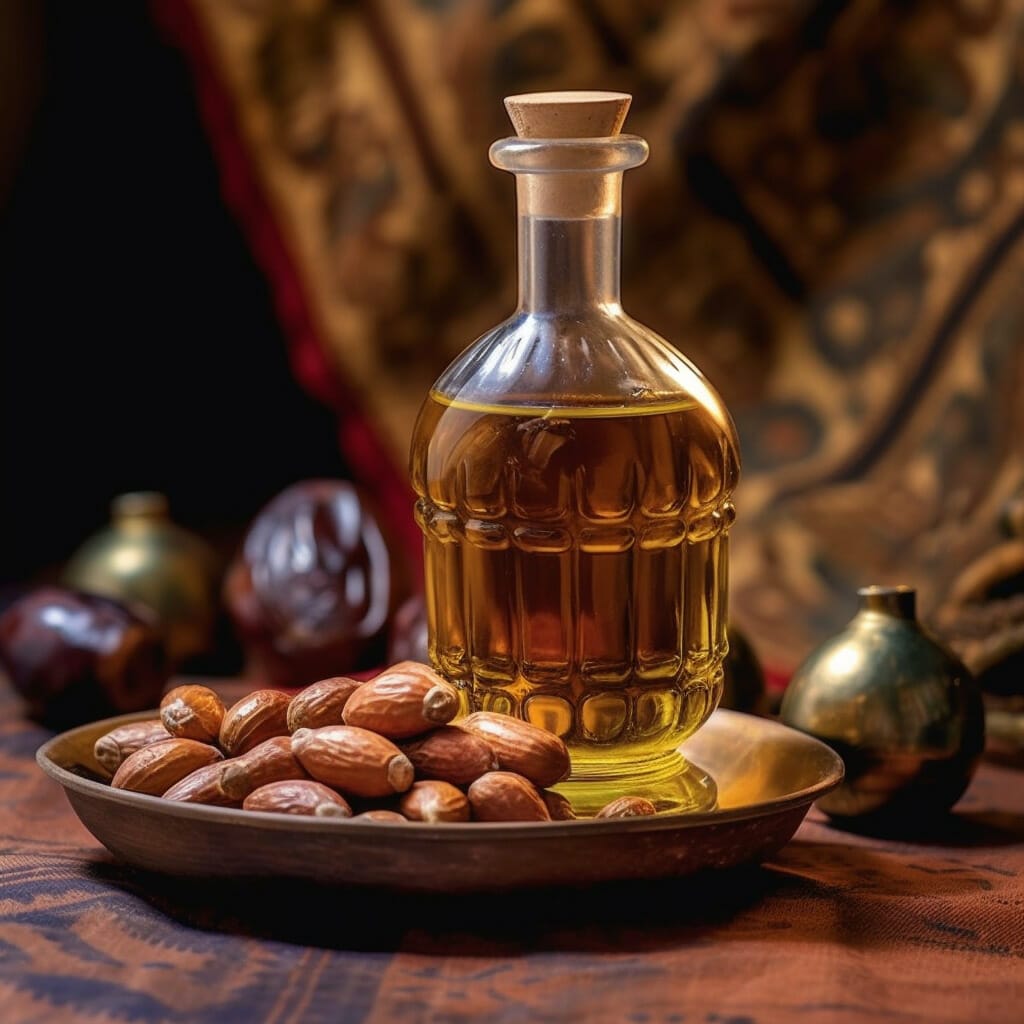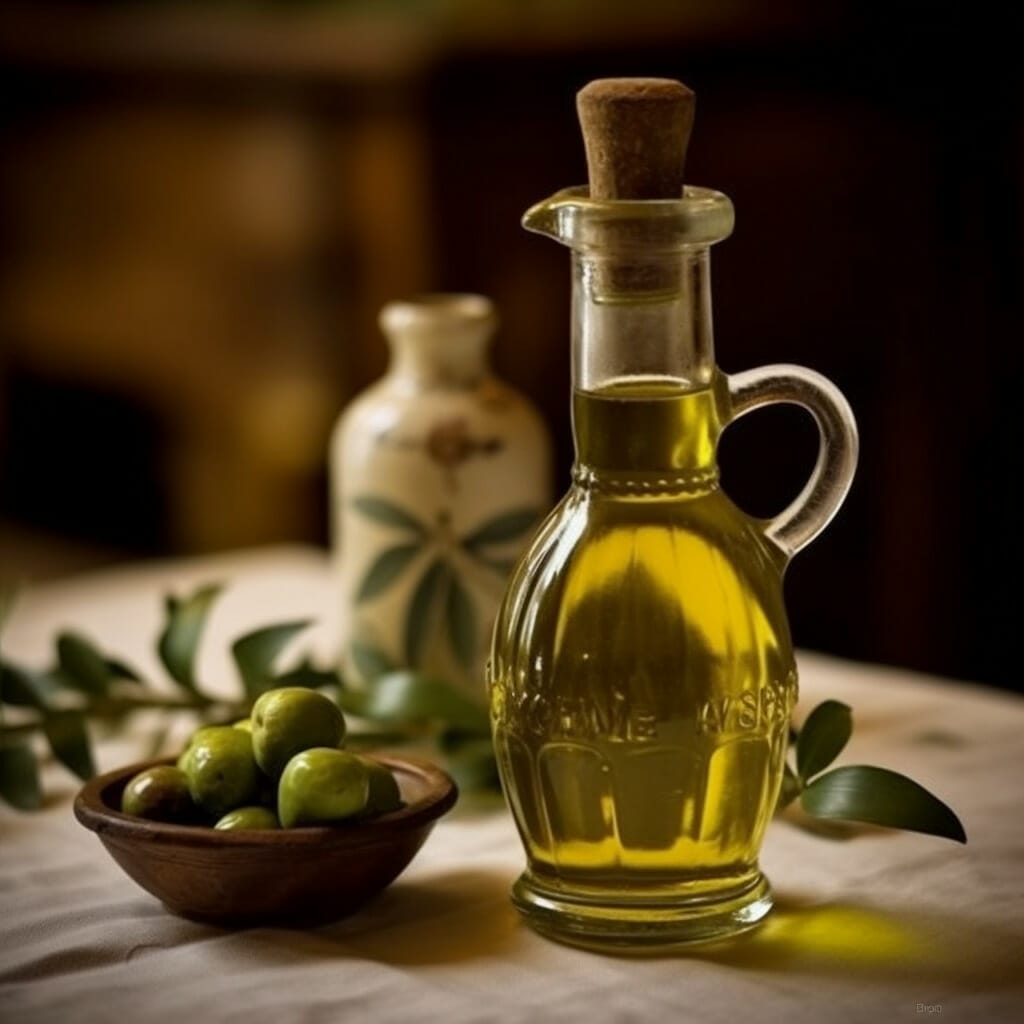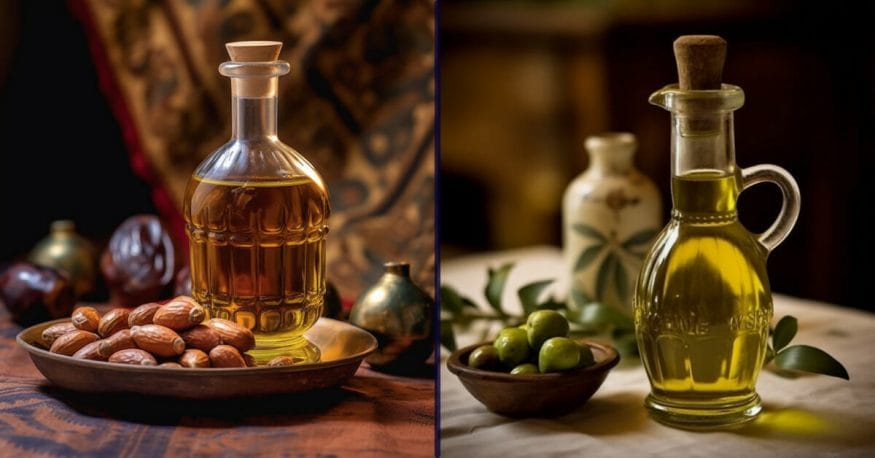Argan vs. olive oil for skin is an ancient debate. Both are often called “liquid gold” and are loaded with vitamin E and polyphenols. They can work wonders for your skin, but only when applied the right amount to the right skin type.
If you have recently heard a lot about the benefits of argan and olive oil and are not sure which one to use in your daily skincare routine, don’t panic.
This guide will give you a detailed analysis of both oils, after which you won’t have any doubts about which exactly is best for your skin type. So, let’s dive into the details to find out what suits you.
Argan Oil
Origins: Native to Morrocco
Production: Derived from the kernels of the argan tree
Nutrient composition: Rich in essential fatty acids, including omega-6 and omega-9 fatty acids, antioxidants, such as vitamin E, and other beneficial compounds like sterols and polyphenols
Pros: Hydrates and softens the skin, tames frizzy hair, and protects against environmental damage
Cons: Relatively expensive due to its limited production and labor-intensive extraction process; some people may also have allergies or be sensitivities to it
Argan oil is produced from the kernel of the argan tree, also called Argania Spinosa. The argan trees are native to Morocco, where the argan oil was used to treat ailments such as wrinkles, acne, dry skin, and joint pain.

It is also used in cooking and has huge benefits for people with high cholesterol or arthritis. However, with time, argan oil rose to popularity in the West and is now added to everything, from under-eye serums to shampoo bars.
Argan oil is extracted from the kernel through a labor-intensive process. The fruit from the argan tree is laid out under the sun for drying before removing the flesh from the nut. Then the nuts are broken apart to reveal the kernels. These are roasted and then pressed to obtain the oil.
The Benefits of Argan Oil
Similarly to rosehip oil, argan oil is packed with antioxidants, such as oleic and linoleic acid, omega-3 fatty acids, and vitamins, such as vitamins A, D, and E, that make it extremely beneficial for the skin.
Here are some amazing benefits of argan oil for the skin:
Anti-Ageing Properties
Argan oil contains 42.8% oleic acid compared to olive oil, which contains 55-83%. On the other hand, it contains 36.8% of linoleic acid as opposed to a mere 3.5-21% in olive oil.
Both oleic acid and linoleic acids are omega-9 saturated fatty acids that lock in moisture and fight free radicals. They help repair damaged skin, which is essential in battling premature aging.
Improves Skin Elasticity
According to a study, women who applied about ten drops of argan oil onto their skin every day during menopause experienced an improvement in their skin elasticity. We know that during menopause, estrogen secretion decreases, which disrupts many skin functions, eventually leading to saggy skin and wrinkles.
The vitamin E present in argan oil plays a huge role in protecting your skin from UV rays due to its antioxidant properties, while the fatty acids battle wrinkle and fine lines and improves your skin’s elasticity.
Non-Comedogenic
Argan oil has a zero comedogenic rating, which means it is very unlikely to clog your pores and trigger breakouts. Facial oils have a comedogenic rating between 0 and 5, with 0 being the least likely to clog your pores and 5 being the most likely. People with acne-prone or oily skin can benefit from argan oil and use it without worrying about breaking out anymore!
Eases Inflammation
Argan oil contains vitamins A and E that have anti-inflammatory properties, and can be used to treat skin infections, bug bites, and rashes. Due to these properties, argan oil has been shown to treat a number of skin conditions, including psoriasis, atopic dermatitis, eczema, and rosacea. It also exhibits natural antibacterial and antiseptic properties, which can help protect wounds from infections and facilitate healthy wound healing, as well as minimize scarring.
Moisturizing
Apart from its other properties, argan oil is best for treating dry, chapped skin. This is because it is loaded with essential fatty acids like linoleic acid and oleic acid that improve hydration, lock in moisture, and absorbs into the skin without leaving behind a greasy residue. It will restore your skin’s protective barrier and remove any flakiness or signs of dry skin.
Fades Hyperpigmentation
Argan oil is known for its ability to help fade hyperpigmentation. The high levels of antioxidants and vitamin E can promote skin cell turnover and help reduce the appearance of dark spots and uneven skin tone. Regular application of argan oil to affected areas can gradually fade hyperpigmentation, revealing a more even complexion.
Reduces Under-Eye Puffiness
The soothing and moisturizing properties of argan oil make it an excellent choice for reducing under-eye puffiness. Gently massaging a small amount of argan oil around the delicate eye area can help improve blood circulation, reduce inflammation, and diminish the appearance of puffiness and bags. Its hydrating properties can also help smooth and soften the skin, giving a refreshed and rejuvenated look.
Natural UV Protection
While argan oil cannot replace a dedicated sunscreen, it does offer some natural UV protection. The vitamin E and antioxidants present in argan oil help neutralize free radicals generated by sun exposure, reducing potential damage to the skin. However, it’s important to note that the level of UV protection provided by argan oil is relatively low, so it should not be solely relied upon as a sunscreen substitute.
Prevents and Reduces Stretchmarks
Argan oil is often used to help prevent and reduce the appearance of stretch marks. Its moisturizing properties can improve skin elasticity and suppleness, which can be beneficial during pregnancy or periods of rapid weight gain. Regular application of argan oil to areas prone to stretch marks, such as the abdomen, thighs, and breasts, can help keep the skin hydrated and may contribute to minimizing the formation of stretch marks.
Potential Side Effects
There aren’t many serious side effects of argan oil. However, here are a few you should keep in mind:
- Argan oil may trigger a skin reaction and cause rashes in people who have sensitive skin or are allergic to it. Do a patch test before applying it all over your face.
- Be wary of accidentally ingesting argan oil, for it might cause diarrhea, nausea, or stomach upset.
- Argan oil might cause breakouts if used too much on the skin, especially if you have oily skin. Start with a moderate amount and increase it if you don’t see any adverse reaction or purging.
Olive Oil
Origins: Spain, Italy, Greece, and Tunisia
Production: Extracted from the fruits of olive trees through a mechanical pressing process
Nutrient composition: Antioxidants, such as vitamin E, and small amounts of vitamins K and E
Pros: Hydrates and nourishes the skin; can also be used as a natural makeup remover and is suitable for all skin types
Cons: May not be suitable for those with oily or acne-prone skin, as it can potentially clog pores and contribute to breakouts
Olive oil is derived from the ripened fruit of the Olea europaea or the olive tree. It is also sometimes referred to as liquid gold and can vary in flavor, color, and aroma. The tree is native to the Mediterranean region and is known to live for thousands of years in both hot and cold weather.

The oil is extremely popular and healthy due to the high amount of monounsaturated fats present in it. The extraction process involves crushing the olive and then squeezing the liquid gold out through pressing.
The health benefits of olive oil also depend on its quality. The type of olives used during the extraction process can result in not only variations in quality but also in color, aroma, and flavor.
The best type of olive oil out there is extra-virgin olive oil which is produced by cold-pressing pure olives without adding any solvents or other additives.
The Benefits of Olive Oil
Olive oil has an amazing nutrient profile that includes vitamins E and K, monounsaturated fats, and antioxidants, making it an amazing ingredient not just in salads but also in your skincare products.
Here are some great reasons why olive oil can be a great addition to your skincare routine:
Antioxidant and Anti-Inflammatory Properties
One kilogram of olive oil contains 0.7-12g of squalene, which is known to have anti-inflammatory, antioxidant, and antibacterial properties. Squalene has the same texture as our skin’s sebum, which is why it is easily absorbed and doesn’t leave your skin feeling oily.
It helps keep your skin soft and hydrated, preventing it from triggering more sebum. This way, it repairs and maintains your skin’s natural barrier and allows deeper penetration of products that you apply onto your skin. Apricot kernel oil is known for the same properties; however, it is a more lightweight oil.
Heals Wounds
According to a study, if olive oil is used on a wound consistently for a month or so, it can act as a natural wound-healing agent. It helps accelerate the wound-healing process and allows a wound to close faster.
So any skin damage, such as atopic dermatitis, episiotomy wound, diabetic foot ulcers, nipple ulcer, or diaper dermatitis, can heal only if olive oil is applied topically for the long term.
Fights Aging and Free Radicals
Olive oil contains antioxidants like vitamin E, phytosterols, and polyphenols. These are great for hunting free radicals within your body and eliminating them by preventing them from oxidizing. This way, it protects your skin from harsh UV rays and maintains your skin’s skin elasticity, which helps control the appearance of fine lines.
Olive oil also contains a compound called hydroxytyrosol, which is a potent antioxidant that battles free radicals and prevents your skin from forming fine lines or wrinkles.
Hydration and Moisture Retention
Olive oil is renowned for its ability to provide deep hydration and moisture to the skin. Its rich composition of healthy fats and antioxidants helps to nourish and replenish the skin’s natural moisture barrier, keeping it supple and hydrated. Regular use of olive oil can help prevent dryness, flakiness, and dullness, leaving the skin feeling soft, smooth, and moisturized.
Brightening of the Skin
Olive oil contains potent antioxidants, such as vitamin E and polyphenols, which contribute to its brightening properties. These antioxidants help to combat free radicals, reduce oxidative stress, and promote a more even skin tone. Regular application of olive oil can help diminish the appearance of dark spots, hyperpigmentation, and discoloration, revealing a brighter and more radiant complexion.
Exfoliation of the Skin
Olive oil can be used as a gentle exfoliator to remove dead skin cells and reveal a fresher, smoother complexion. Its emollient properties help to loosen and dissolve impurities, while its natural fatty acids provide nourishment and moisture to the skin. By mixing olive oil with a natural exfoliant like sugar or coffee grounds, you can create an effective homemade scrub that gently buffs away dead skin cells, leaving your skin revitalized and rejuvenated.
Potential Side Effects
Olive oil is a heavier oil, which is why it can:
- Clog pores and cause breakouts if used in a large amount on oily skin.
- Leave a greasy residue that you can be uncomfortable with.
- Cause redness or irritation on sensitive skin.
How to Use These Oils In Your Skincare Routine
Now that you know how argan and olive oil can benefit your skin, you would be wondering: how exactly should you use them on your skin? Here’s a short guide you can follow to unlock all of their benefits:
Argan oil is great for all skin types as it moisturizes dry skin as well as oily skin without triggering breakouts. You can use it as a:
- Moisturizer: Apply a few drops on your skin after cleansing and gently massage until all of it is absorbed.
- Hydrating agent: If you have dry patches on your skin, take a small amount of argan oil and massage it onto the chapped, flaky skin to get smooth, hydrated skin.
- Massage oil: As argan oil is non-comedogenic, it can work well as a massage oil. Take a small amount and use it to massage your face in circular motions. This increases the absorption of other products and makes your skin soft to the touch.
Olive oil is a relatively heavier oil than argan oil, with a comedogenic rating of 2, which means there are chances it can clog your pores if used in a large amount very often. You can use it for:
- Exfoliation: Add one tablespoon of olive oil in natural sea salt and rub it over your skin gently. It gets rid of dead skin cells, dirt, and results in smooth, glowing skin. You can replace sea salt with sugar and get the same results!
- Dark circles: Take a few drops of olive oil and rub them on your dark circles. Do this every day to help fade them away.
- Massage: Olive oil is also great for massage and getting rid of dry skin. However, oily skin types should use a small amount to prevent breakouts.
DIY Recipes for Radiant Skin
To test out the power and suitability of both of these miraculous oils, I recommend the following two easy DIY recipes that I frequently resort to as part of my routine:
Argan Oil Acne Treatment Serum
Argan oil can really be paired with any essential oil to produce miracle combinations based on your needs. One combination that I resort to at home when dealing with breakouts is again and tea tree oil. Here’s how to make it:
Ingredients:
- 4-5 drops argan oil
- 4-5 drops tea tree oil
- 4-5 drops avocado oil
Instructions:
- Start with a clean, dry face.
- In a small bowl, mix all the oils together.
- Gently massage a small amount of the mixture onto your face using upward circular motions.
- Allow the serum to absorb into your skin for a few minutes before applying any additional skincare products or makeup.
Both tea tree oil and avocado oil have antimicrobial and anti-inflammatory properties that can help fight acne-causing bacteria and reduce inflammation. Together, they can be an effective natural spot treatment for acne. However, it’s important to note that everyone’s skin is different, so it’s always recommended to do a patch test and consult with a dermatologist if you have any concerns or allergies.
Olive Oil Face Cleanser
This DIY olive oil face cleanser can effectively remove dirt, makeup, and impurities while leaving your skin feeling soft and hydrated. In addition to olive oil, honey has antibacterial properties and can help soothe and hydrate the skin.
Ingredients:
- 2 tablespoons extra virgin olive oil
- 1 tablespoon honey
- 1 teaspoon lemon juice (optional)
Instructions:
- In a small bowl, combine 2 tablespoons of extra virgin olive oil, 1 tablespoon of honey, and 1 teaspoon of lemon juice (optional). The lemon juice can help brighten the skin and provide a refreshing scent, but it can be omitted if you have sensitive skin.
- Stir the ingredients well to ensure they are thoroughly mixed.
- Wet your face with warm water to open up the pores.
- Take a small amount of the cleanser mixture and gently massage it onto your face using circular motions. Pay extra attention to areas with makeup or dirt.
- Continue massaging for about 1-2 minutes to allow the cleanser to effectively dissolve impurities and makeup.
- Rinse your face thoroughly with warm water to remove the cleanser.
- Follow with your regular skincare routine, including moisturizer.
Argan Oil vs Olive Oil For Skin: The Ultimate Winner
Having listed all of the above, it’s time to reach a verdict. Here’s how I see it:
Better For Skin: Argan Oil
Argan oil and olive oil both offer benefits for the skin, but argan oil has one major advantage – it is lightweight, non-greasy, and easily absorbed, making it suitable for all skin types. Therefore, when it comes to acne-prone skin, argan oil is the clear winner and is often preferred due to its non-comedogenic nature.
For chapped lips, both oils can offer moisturizing benefits, but argan oil’s fast absorption may make it more convenient for regular use.
Better For Nails: Both Argan and Olive Oil
Argan oil’s vitamin E content helps nourish and strengthen the nails, promoting growth and reducing brittleness. However, olive oil, with its moisturizing properties, can also provide hydration to the nails and cuticles. Applying either oil regularly and massaging it into the nails can help improve their overall condition.
Better For Hair: Argan Oil
Argan oil is renowned for its positive effects on hair health. It deeply moisturizes the hair strands, reducing frizz and enhancing shine. It also contains essential fatty acids and antioxidants that help nourish and protect the hair from damage. Olive oil, with its emollient properties, can also moisturize the hair and improve manageability. However, argan oil’s lighter texture and ability to penetrate the hair shaft making it a popular choice for hair treatments and leave-in conditioners. Other oils renowned for their amazing impact on hair include rosemary oil and jojoba oil – it is worth checking them out.
Better in Terms of Price: Olive Oil
In terms of price, olive oil is generally more affordable and widely available compared to argan oil. Argan oil is sourced from the rare argan tree, primarily found in Morocco, which contributes to its higher price point. Olive oil, being more accessible and commonly produced, tends to be more budget-friendly.
The Verdict
As argan oil is non-comedogenic and lightweight, it is best for people with oily or combination skin types. It absorbs fast and doesn’t leave behind an oily layer. You can also add a few drops to your moisturizer if you don’t want to apply the oil directly onto your skin.
On the other hand, olive oil is a bit heavier and is best suited for people with dry skin types. It can help get rid of dryness, flakiness, and chapped skin. You can also use it as a makeup remover in your double cleansing routine to clean your face thoroughly from makeup while maintaining your skin’s natural barrier and not stripping away your skin’s natural oils.
FAQs
Is argan oil better than olive oil for the skin?
Argan oil and olive oil both offer benefits for the skin, but their effectiveness may vary depending on individual preferences and skin types. Argan oil is renowned for its moisturizing and nourishing properties, making it a popular choice for dry or mature skin. Olive oil, on the other hand, contains antioxidants and healthy fats that can help maintain the skin’s natural moisture barrier. Ultimately, the choice between argan oil and olive oil for skin care depends on personal needs and preferences.
Can I use argan oil on my face every day?
Yes, you can use argan oil on your face daily. It’s lightweight and non-comedogenic, making it suitable for most skin types. Due to its ability to mimic the skin’s natural sebum, it can support healthy skin oil production.
Do dermatologists recommend argan oil?
Many dermatologists recommend argan oil for its moisturizing and nourishing properties. It’s rich in essential fatty acids and antioxidants, which can help improve skin hydration, texture, and elasticity.
How to use argan oil for skin?
To use argan oil for the skin, apply a few drops to clean, dry skin and gently massage it in. It can be used as a moisturizer, added to your existing skincare routine, or applied to specific areas that need extra hydration or nourishment.
Which oil is best for hair growth?
There are several oils that can promote hair growth, including argan oil, castor oil, and coconut oil. These oils can help nourish the scalp, improve blood circulation, and provide essential nutrients to the hair follicles, supporting healthy hair growth.

